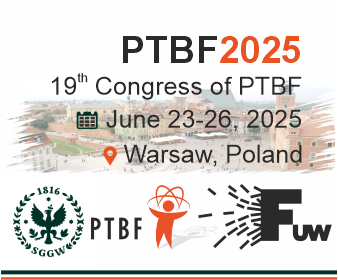Poszukujemy Doktorantów do współpracy w realizacji projektu badawczego NCN OPUS18 pt. „Rola mitochondrialnych kanałów potasowych w uszkodzeniach wywołanych pyłami miejskimi (PM) – poszukiwanie nowej strategii cytoprotekcji” realizowanego w Konsorcjum Szkoła Główna Gospodarstwa Wiejskiego w Warszawie i Instytut Biologii Doświadczalnej im. M. Nenckiego w Warszawie.
Studia będą realizowane w Szkołach Doktorskich:
Warszawska Szkoła Doktorska Nauk Ścisłych i BioMedycznych
Szkoła Doktorska SGGW
Szczegółowe informacje: piotr_bednarczyk@sggw.edu.pl, tel.: 22 59 386 20.
Doktorat 1: PhD student will be mainly focused on regulation of the mitochondrial potassium channels by particulate matters (PMs, one of the main smog component) and other modulators. Furthermore, regulation of mitochondrial functions by particulate matters will be studied. Additionally, the fellow will analyze modulation of ion transport across epithelial tissues/cells by PMs and verify the role of potassium channels in this process. It is planned to use mitochondria/mitoplasts from various cellular models (also newly developed in the project).
Main experimental techniques include: mitoplast patch-clamp, ion transport across monolayer, Ussing experiments, high resolution respirometry, mitochondrial membrane potential measurement, mitochondrial ROS synthesis, cell cultures in vitro, mitochondria and mitoplast preparation.
We are looking for creative, willing to cooperate team player with biological, chemical or biophysical background. We expect basic knowledge in biochemical and biophysical techniques. Experience in electrophysiology will be additional advantage. Good written and verbal communication skills in English are recommended.
Doktorat 2: PhD student will be mainly focused on analysis of mechanisms of PMs induced cell death and cytoprotective role of the mitochondrial potassium channels against PMs induced injury. We plan to use existing experimental models based on cell lines of epithelial origin. Additionally, the fellow will work on development of new cellular models using modern tools (e.g. CRISPR/Cas9 technology, gene silencing, gene overexpression). The student will analyze among others cell survival, expression of selected genes, protein levels (with special focus on mitochondrial fraction), composition of mitochondrial respiratory chain complexes.
Main experimental techniques include: molecular biology (e.g. quantitative PCR, mutagenesis), cell cultures in vitro, cell death assays, mitochondria preparation, SDS and Blue-Native Page, Western Blot.
We are looking for creative, willing to cooperate team player with biological or biotechnological background. We expect basic knowledge in molecular biology and biochemical techniques. Good written and verbal communication skills in English is recommended.




